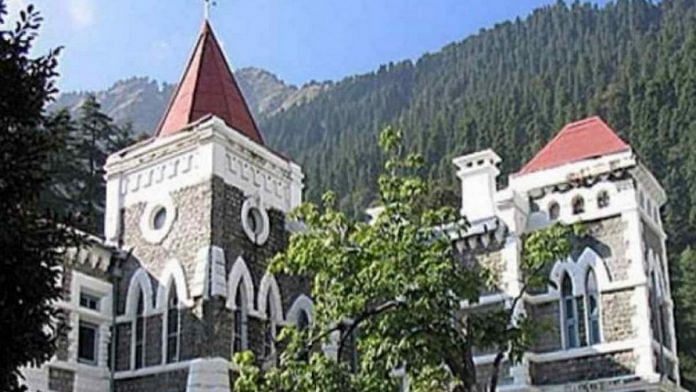New Delhi: The Uttarakhand High Court has declared a law allowing former state chief ministers to occupy government bungalows without paying the market rent “unconstitutional”. The court said the law was not “guided by constitutional principle of equality” and conferred “undeserved largesse” to CMs even after they demitted office.
A bench of Chief Justice Ramesh Ranganathan and Justice R.C. Khulbe Tuesday said the Uttarakhand Former Chief Ministers Facility (Residential and other facilities) Act, 2019, not only violates Article 14 (right to equality) of the Constitution, but also is ultra vires to the “separation of power doctrine”, which restricts the three organs of the state — judiciary, legislature and executive — from encroaching upon each other’s jurisdictions.
The court noted that the state government enacted the legislation with the specific purpose of overruling a March 2019 high court verdict, directing former chief ministers to pay market rent for bungalows allotted to them by the state in case they continue to occupy them upon demitting office.
The impugned law of 2020 was a measure of “statutory over-ruling”, said the court said.
The bench stated that it is the court’s duty to declare the provisions of a law invalid where they are found be in violation of the Constitution, and hesitation on its part would be “shirking the responsibility”.
“No element of judicial arrogance can be attributed to courts when they decide whether or not the law made by the legislature is in conformity with the provisions of the Constitution,” held the judges.
Also read: Village level quarantine centres are ‘the worst’: Uttarakhand HC asks state to fund gram sabhas
State can’t create a special class of citizens
The high court judgement came on a public interest litigation (PIL) filed by NGO Rural Litigation and Entitlement Kendra.
It said every action or decision of the state to give largesse must be founded on a “sound, transparent, discernible and a well-defined policy”. State benefit cannot be extended to any person at the will and whim of political entities or officers.
“Except where larger public interest so requires, allotment of government bungalows for a consideration lesser than the market rent is illegal, as the state has no right to fritter away government property in favour of private persons,” the Uttarakhand HC ruled.
A legislation must adhere to the “doctrine of equality” principle from where emerge the concepts of justice and fairness.
The court found conferment of the benefits without any “adequate determining principle”, and said the law created a “class of citizens” without any reasonable justification.
“The Constitution recognises only one single class of citizens with one singular voice (vote) in the democratic process, subject to provisions made for backward classes, women, children, SC/ST, minorities, etc,” the court said.
A special class of citizens, subject to the exception noted above, is “abhorrent to the constitutional ethos,” held the bench. Chief ministers upon demitting office are on par with common citizens, not entitled to any preferential treatment.
“Government bungalows, allotted to the former chief ministers after they had demitted public office(s), constitute public property that belongs to the people of the country, and is meant for use of the current holders of public office,” said the court.
Also read: Ramdev sends Ayurveda medicines to quarantined Uttarakhand CM Rawat, ministers to fight Covid
Distribution of state property must be just and fair
As the legal owner of natural resources, the state is empowered to distribute them. But the process of distribution must be guided by constitutional principles, in particular the doctrine of equality and larger public good, said the Uttarakhand High Court, referring to several Supreme Court judgments.
“This doctrine of equality, which emerges from the concept of justice and fairness, must guide the state in determining the actual mechanism for distribution of natural resources. State-owned or public property is not to be dealt with at the absolute discretion of the executive. Certain principles and precepts should be observed. Public interest is the paramount consideration. Nothing should be done which gives an appearance of bias, jobbery or nepotism,” said the court.
The legislative exercise, recognising former chief ministers as a special class of citizens, is based on irrelevant and legally unacceptable considerations, unsupported by any constitutional sanctity, it concluded.
Also read: Satpal Maharaj, 23 family & staff members test Covid-positive, CM Rawat in self-quarantine




I am from Uttarakhand. Thanks for this report and letting us know the truth.